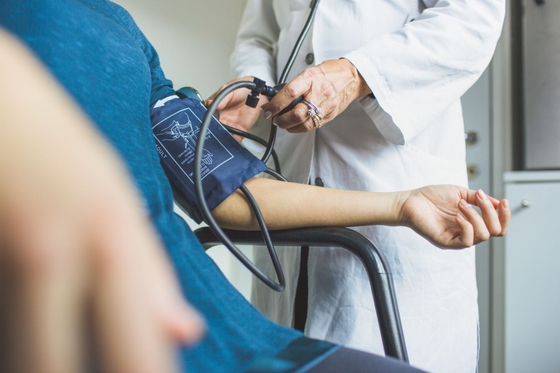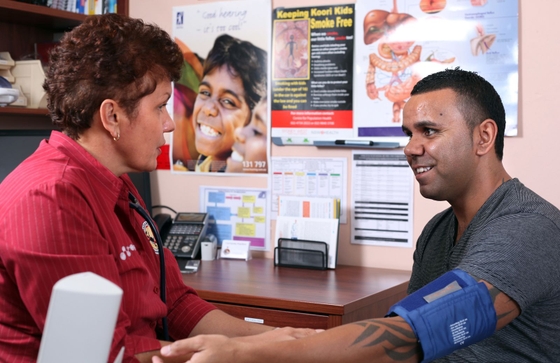
24-hour blood pressure monitoring
Blood pressure monitoring at home using a 24-hour blood pressure monitor test.
Blood pressure can be monitored in many different settings including a clinic, hospital or at home.
Blood pressure is the pressure of your blood on the walls of your arteries. Your blood pressure will go up and down naturally throughout the day depending on what you are doing. For example, it will go up if you are doing exercise and down when you are resting.
How is the test done?
A sleeve, or cuff, is placed firmly over your upper arm. The cuff often has markers to line up with the inside bend of your arm. When the measurement is happening, the unit will pump air into the cuff and slowly inflate, getting tighter around your arm. You may feel some numbness or tingling as the cuff gets tighter. The cuff will then slowly deflate, and the tightness will reduce.
A blood pressure reading with two numbers will be recorded to measure when the blood flow to your arm stopped and when it returned. These numbers reflect the pressure of blood inside the walls of your artery.
Your doctor might want to know how your blood pressure changes over the day and night. This is known as '24-hour (or ambulatory) blood pressure monitoring'. You will need to wear a blood pressure unit. The unit consists of a blood pressure cuff that is worn on your upper arm and connected to a monitor. You wear the monitor on a strap over your shoulder.
For the next 24 hours, your heart rate and blood pressure will be measured at 20-30 minute intervals during the day and night. When you feel the cuff getting tighter, it’s important to stop and rest until the measurement is complete. Usually each reading takes 30-40 seconds.
When you have the 24-hour blood pressure monitor connected, it will take about 15 minutes to have the cuff put on and get instructions. You will need to return to the hospital or clinic at the same time the next day (24 hours later) to have the strap and monitor taken off.
Why is the test done?
24-hour blood pressure monitoring can show how your blood pressure changes over the day and night. It can help your doctor understand when and why your blood pressure goes up and down. Your doctor will tell you what your ideal blood pressure should be and if your blood pressure is high. High blood pressure is a very important risk factor for heart disease. Monitoring your blood pressure can help your doctor make treatment decisions, like whether to start you on blood pressure medicines.
Preparing for the test
There’s nothing special you need to do before having your 24-hour blood pressure monitor fitted. You will be given instructions on what you need to do while wearing the monitor. This is to make sure the monitor gets accurate readings.
Some things to remember while wearing the monitor:
- Wear a loose-fitting shirt.
- Remain still during the readings (when the cuff tightens).
- Press the button on the monitor as soon if you notice any symptoms such as dizziness, headaches, chest pain or sudden shortness of breath.
- Make sure the monitor stays connected at all times.
- Take your medicines as normal.
Knowing what your blood pressure is and having it regularly checked is important in maintaining a healthy heart.

Medical tests for heart disease
Discover the types of heart tests used to detect heart disease, heart blockages, or heart attacks, from routine heart tests to advanced tests for heart disease.

Blood pressure and your heart
Learn how blood pressure affects your heart health. Find out what high blood pressure means, how to measure it, and ways to keep it under control.

Under pressure – what is blood pressure and why does it matter?
Almost half of all heart attacks are due to high blood pressure, and the only way to find out if you have high blood pressure is to have it checked regularly.
Last updated09 March 2024
Last reviewed18 January 2024